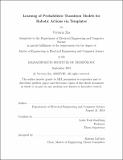| dc.contributor.advisor | Leslie Pack Kaelbling. | en_US |
| dc.contributor.author | Xia, Victoria(Victoria F.) | en_US |
| dc.contributor.other | Massachusetts Institute of Technology. Department of Electrical Engineering and Computer Science. | en_US |
| dc.date.accessioned | 2019-07-05T17:18:42Z | |
| dc.date.available | 2019-07-05T17:18:42Z | |
| dc.date.copyright | 2018 | en_US |
| dc.date.issued | 2018 | en_US |
| dc.identifier.uri | https://hdl.handle.net/1721.1/121497 | |
| dc.description | This electronic version was submitted by the student author. The certified thesis is available in the Institute Archives and Special Collections. | en_US |
| dc.description | Thesis: M. Eng., Massachusetts Institute of Technology, Department of Electrical Engineering and Computer Science, 2018 | en_US |
| dc.description | Cataloged from student-submitted PDF version of thesis. | en_US |
| dc.description | Includes bibliographical references (pages 71-72). | en_US |
| dc.description.abstract | In this work we present templates as an approach for learning probabilistic transition models for actions. By constructing templates via a greedy procedure for building up lists of deictic references that select relevant objects to pass to a predictor, we learn compact representations for a transition model whose training time and performance do not suffer from the presence of additional objects in more complex scenes. We present various algorithms for simultaneously separating training data into corresponding templates and learning template parameters, through the use of clustering-based approaches for initial assignment of samples to templates, followed by EM-like methods to further separate the data and train templates. We evaluate templates on variants of a simulated, 3D table-top pushing task involving stacks of objects. In comparing our approach to a baseline that considers all objects in the scene, we find that the templates approach is more data-efficient in terms of impact of number of training samples on performance. | en_US |
| dc.description.statementofresponsibility | by Victoria Xia. | en_US |
| dc.format.extent | 72 pages | en_US |
| dc.language.iso | eng | en_US |
| dc.publisher | Massachusetts Institute of Technology | en_US |
| dc.rights | MIT theses are protected by copyright. They may be viewed, downloaded, or printed from this source but further reproduction or distribution in any format is prohibited without written permission. | en_US |
| dc.rights.uri | http://dspace.mit.edu/handle/1721.1/7582 | en_US |
| dc.subject | Electrical Engineering and Computer Science. | en_US |
| dc.title | Learning of probabilistic transition models for robotic actions via templates | en_US |
| dc.type | Thesis | en_US |
| dc.description.degree | M. Eng. | en_US |
| dc.contributor.department | Massachusetts Institute of Technology. Department of Electrical Engineering and Computer Science | en_US |
| dc.identifier.oclc | 1098214664 | en_US |
| dc.description.collection | M.Eng. Massachusetts Institute of Technology, Department of Electrical Engineering and Computer Science | en_US |
| dspace.imported | 2019-07-05T17:18:36Z | en_US |
| mit.thesis.degree | Master | en_US |
| mit.thesis.department | EECS | en_US |
